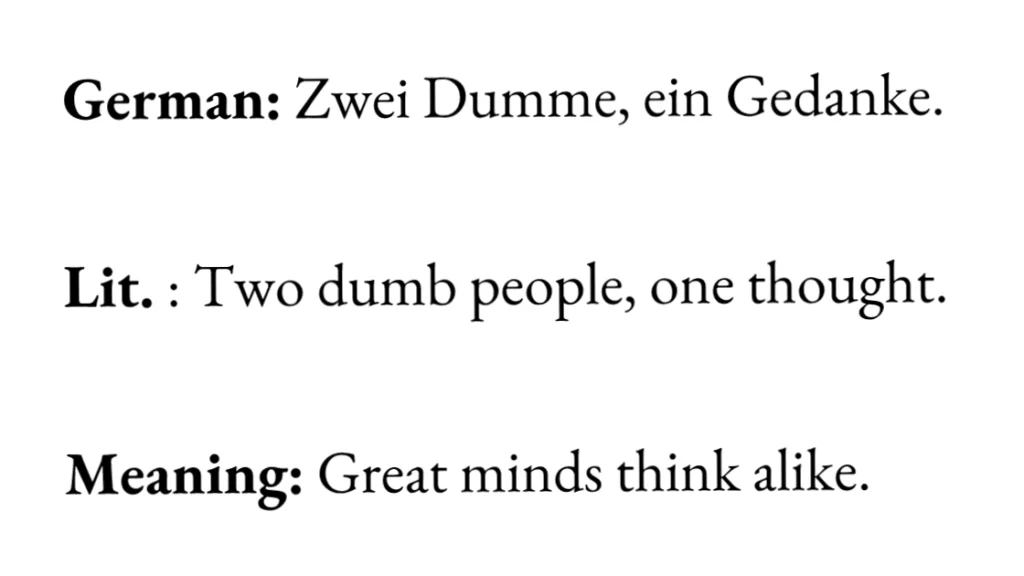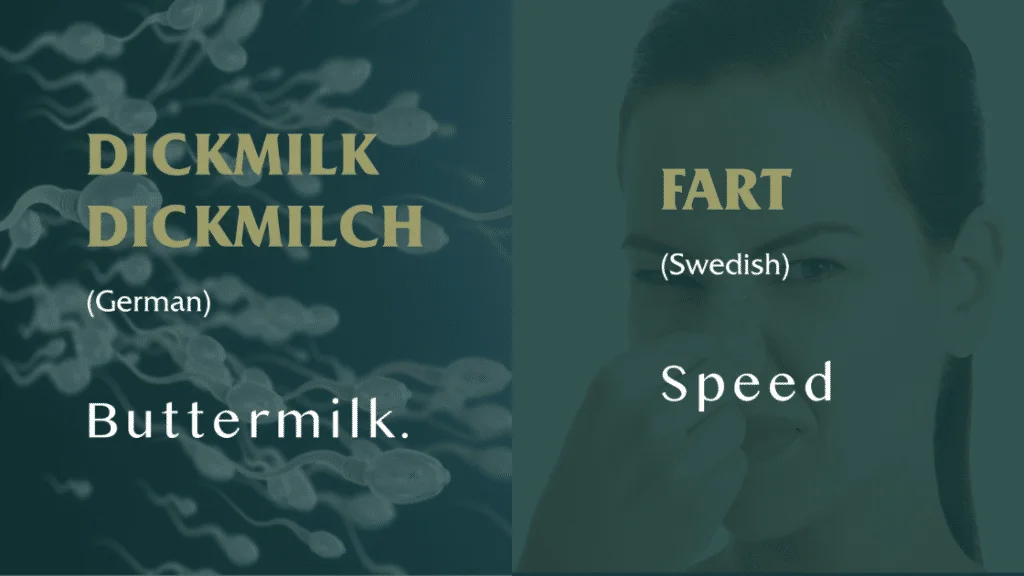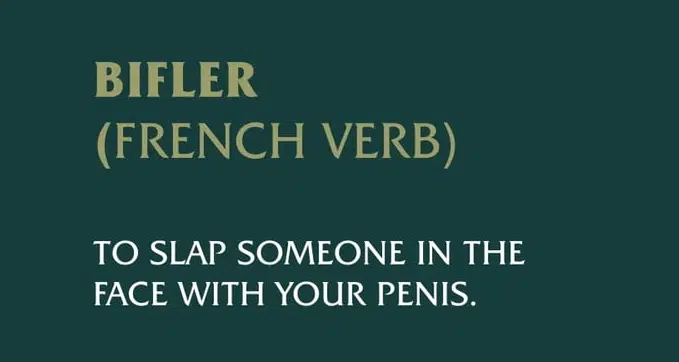Idioms can tell us a lot about how speakers of a particular language express themselves. One interesting idiom that has an amazing and interesting variety across languages is the one describing rainfall. In English, “it’s raining cats and dogs” describes heavy rainfall. But what do speakers of other languages say when it’s raining cats and dogs? Let’s find out. (If you don’t see your language, please add it in a comment).
Spanish
It’s raining dung head-first. “Esta lloviendo caen soretes de punta.”
French
“It’s raining like a pissing cow.”“Il pleut comme une vache qui pisse”.
Afrikaans
It’s raining old women with clubs.“Ou vrouens met knopkieries reen.”
Maltese
The doors of heaven have opened up.“infetħu bibien is-sema“
German
It’s raining/pouring shoemakers.”Es regnet/gießt Schusterjungs.”
Slovak
Tractors are falling. “Padajú traktory.”
Danish
It’s raining cobbler boys. “Det regner skomagerdrenge.”
Greek
It’s raining chair legs.“Rixnei kareklopodara.”
Hebrew
A flood is coming down. “yoréd mabúl”
Moroccan Arabic
It’s raining like a thread from the sky. “katsob khayt mn sma.”
Irish
It’s throwing cobblers knives.“Tá sé ag caitheamhsceana gréasaí”
Japanese
Earth and sand are falling.土砂降りである (doshaburi de aru)
Turkish
It’s raining like long strings of rope.“Sicim gibi yağmur yağıyor.”
Brazilian Portuguese
It’s raining pocket knives. It’s raining frogs’ beards.Está chovendo canivetes or Está chovendo barba de sapo.
Polish
It’s throwing frogs.“Rzuca żabami.”
Cantonese
dog shit is falling.落狗屎 (lohk gáusí)
Norwegian
It’s raining female trolls.“Det regner trollkjerringer.”
Serbian
The rain falls and kills the mice.Пада киша уби миша (Pada kiša, ubi miša)
Swedish
It’s raining like rods/ladles / the rain stands like rods in the hillside.“Det spöregnar / ösregnar / Regnet står som spön i backen.”








Russian
It’s pouring like from the basket.
“Льёт как из ведра” (Transcription: Lyot kak iz vedra).
The French also say: it’s raining ropes. “Il pleut des cordes.”
Hungarian
It’s raining as if poured from a bin
” esik mintha dézsából öntenék”
Hausa
Ana ruwa kamar da baking kwarya.
It’s raining like the edge of calabash.
Catalan: It’s raining in wineskins and buckets (Plou a bots i barrals).
In Italian:
It’s raining like God’s sending it! (Piove che Dio la manda!)
It’s raining from buckets/basins! (Piove a secchiate/catinelle!)
It’s a diruptive rain! (Piove a dirotto!)
Estonian
It’s pouring as from a beanstalk
*Valab nagu oavarrest
We say in Slovakia “Leje ako z krhly”
In Mexico we say “the sky is falling down” el cielo se está cayendo
In German you say also: Es regnet Bindfäden (It’s raining strings). In Dutch we say: Het regent pijpestelen (It’s raining pipesticks).
French
It’s raining ropes
Il pleut des cordes.
In Polish it should be: „Leje jak z cebra”
The correct version would be “It’s pouring like from a bucket”.
Canadian French
It’s raining to drink standing up.
Il pleut à boire debout.
Está lloviendo mares
(Spanish from Spain: it’s raining seas)
In Portuguese (Brazil), we also say “the world is falling apart” (“Está caindo o mundo!”).
And “raining pocket knives” is actually used for something else, at least in my place. We use to show surprise when something VERY unlikely to happen actually happens, or to state that something won’t happen at all. “I can’t believe that happened! It will be raining pocket knives”.
Það mígrignir! (Icelandic)
Exactly the same in Romanian.
“Plouă cu găleata”
like from a bucket, I would say)
Dutch: Het regent pijpenstelen – it’s raining pipe handles
German: Es regnet Bindfäden – it’s raining threads/cords
Es regnet wie aus Gießkannen – it’s raining like a watering can
Another one for Spanish: “Están lloviendo maridos”
(It’s raining husbands).
It means “Mưa tằm tã” in Vietnamese.
Bulgarian:
It’s pouring like out from a basket (Лее се като из ведро. Lee se kato iz vedro)
The Spanish one is redundant. You say: “Están cayendo/Caen soretes de punta”.
With “raining”, you’d say: “Está lloviendo/Llueve a cántaros” (it means something like “it’s pouring”).
As a native German i habe never heard your version of “Schusterjungs” – it might be regional.
Here it rains “Bindfäden” (string) or “aus Eimern/Kübeln” (from buckets).
In Estonian it is:
Sajab nagu oavarrest.
Raining like from a bean’s stem.
In the UK, geri halliwel says, “it’s raining men” ?
Polish also:
It’s pouring like from the basket.
“Leje jak z cebra.”
In French also: il pleut des hallebarde. Its raining in halberd.
Seems a halberd is a long pole with a scimitar-like head
In Portugal we say:
Está a chover a cântaros/potes. (It’s raining by pots).
The slovak idiom for heavy rain is- it is pouring like from a watering can. Tractors are in different idiom : even if tractors will be falling (from the sky)- meaning something sure, that is going to happen no matter what
Hungarians use the bucket analogy as well.
‘Esik, mintha dézsából öntenék’
Oberwanie chmury – the clouds are torn down
(Québec) French : il pleut des clous
Its raining nails
“Caen soretes de punta” is an Argentinian saying. Standard Spanish would be:
Llueve a cántaros – it’s raining pitchers
Llueve a mares – it’s raining seas
The Serbian one is inaccurate. “Pada kiša, ubi miša” is a rhyme grown-ups sometimes say to kids when it’s raining.
The actual thing we say when it’s raining cats and dogs would be “Lije kao iz kabla.” The meaning is the same as the expression in Russian and Romanian (written above): “It’s pouring like from a bucket.”
Português: “Chove a cântaros”.
That’s like the song “it’s raining men Hallelujah” , in some parts of Mexico you can also hear “Está lloviendo a cántaros “
Canadien French
I never heard the one in french in the post. Maybe in France?
Il pleut à scieau (More from the province of Quebec)
(Le mot scieau n’existe pas, mais il provient du mot “sceau”, prononcé avec un “i” dans cette expression)
– It’s raining from bucket
Il pleut des cordes
– It’s raining ropes
Il pleut à boire debout
– It’s raining To drink standing up
European Portuguese
Chove a cântaros!
French Canadian (Quebecois) have a really colorful language. i heard mostly 3 way to this expression here.
it’s raining nails (mostly mean that the rain hit really hard)
-il pleut des clous
it’s raining cords (it’s an old unit of measurement for firewoods) (it could also refer to ropes instead of cords)
-il pleut des cordes
and my favorite:
It rains to drink standing
-Il pleut à boire debout
Hungarian?
Zuhog, mintha dézsából öntenék.
It’s pouring like a flood from a vat.
It’s raining men!
(ノ´▽`)ノ♪
alleluia!
In Italian, piove a catinelle…
It is pouring like from a bucket
Piove come Dio la manda.
It’s raining as if God sends it.
Italia
It’s raining streams. Es regnet in Strömen.
Italian: Piove a catinelle.
In Sardinian we say in different versions a sentence like “The sky/air is tumbling down”
Never heard “soretes” but chuzos: Caen chuzos de punta
Finnish:
Vettä tulee kuin Esterin perseestä = Water comes like from Ester’a ass.
Correct for French would be: Il pleut comme vache qui pisse (so without the “une”).
In Dutch, they Say: Het regent pijpestelen (> It rains pipe stems)
Finnish also:
Sataa kuin saavista kaataen = rains like it’s poured from a bucket
Sataa kuin aisaa = rains like beams
Czech:
Wheelbarrows are falling.
“Padají trakaře.”
Welsh: Bwrw hen wragedd a ffyn. Raining old women and sticks.
It’s the second option, but both “Rzuca żabami” and “Leje jak z cebra” are used.
What is the shoemaker/cobbler connection? Thought it may be a German Danish pun but Ireland too???
In Welsh, we use the phrase:
“Mae’n bwrw hen wragedd â ffyn”,
which translated means:
“It’s raining old ladies with sticks”.
Spanish: Estan cayendo chuzos de punta. Some time ago there were “serenos”, some kind of night guard in the big cities in Spain. They had the key of the buildings in the area they covered. People will clap their hands and call “sereno!!” and he hill hit the ground with the baton (chuzo) which was also a defense tool, and come to open the door. They were very helpful and knew everyone in the neighborhood! So, they are falling batons, is the translation. De punta, means straight down, not horizontally.
Also “The sky has opened.” “Небето се разтвори.”
Czech: Leje jako z konve.
It’s pouring like from a watering can.
and also – Piove a catinelle – it rains buckets of water
In Serbian it’s the same, “Lije kao iz kabla”. We borrowed Kubel from German and changed a prononciation a bit. When I was younger, I thought it was about a cable ?, which is not so strange after all, considering we had “ropes” in some other comment.
In Venezuelan Spanish we have: “Está cayendo un palo de agua”, which literally means “a stick of water is falling”.
大雨如注 (dàyǔ-rúzhù)
It’s raining in torrents.
In Mandarin-
It is 倾盆大雨-qing(1)pen(2)da(4)yu(3)
(Dumping bucket of big of rain)
Korean: 비가 억수같이 내린다
The rain is falling like a downpour
In Québec, Canada, we also say
It’s raining nails
Il pleut des clous
There is an alternative saying in Turkish;
The sky has a hole/puncture.
I heard your version too, but I think if it’s a thunderstorm with rain, we use the puncture one. ?
It’s raining like long strings of rope.
“Sicim gibi yağmur yağıyor.”
The danish expression is that it is raining shoemaker’s boys(apprentices). Once there was a shoemaker in Copenhagen with a really bad temper. On one of his bad days he got angry with one of his boys and threw him out of the Window from the second floor. His other four apprentices complained to him that her shouldn’t have done that, and he threw Them out as well. Only one survived.
Spanish: está lloviendo a cántaros = to pour with rain
Thai
It’s raining like the rain is crying and cannot open its eyes and ears.
ฝนตกไม่ลืมหูลืมตา [Fon tok mâi leum hŏo leum dtaa]
Nigdy nie słyszałam wersji “rzuca żabami” xD
In Egypt we say:
(أبواب السما اتفتحت)
Which means ( all the gates of heaven has opened)
Arabe tunisia
It Just like arabe marocain but not one thread, it is two hhhh
In Farsi we say it’s raining like the tail of a horse. Or:
“Mesle dome asb baran mi ayad”
“jak z cebra” should be rather “like from a bucket”. Basket is koszyk
Only heard the Norwegian version about snow. It snows female trolls. “Det snør trollkjerringer”
It rains as from a bucket. “Det bøtter ned” Most common one.
Or it rains as heavens gates is open, “Det regner som om himmelens sluser er åpne.”
also Padají trakaře = Wheelbarrow are falling
Another Norwegian variation is
“Det regner tollekniver og gamle kjerringer”
It’s raining pocket knives and old hags/wives
In Dutch:
“Het regent pijpenstelen.”
It’s raining pipe stems.
*Scieau -> “sieau” pour seau (bucket)
(Sceau= seal/stamp)
“sieau” is something you could hear from old people in la Sarthe, France, north of Loire valley, south of Normandie, where people from Québec are mainly originally from.
They also say “ieau” instead of “eau” (water) so you can hear them saying “un sieau d’ieau”
In Dutch you can also say:
“Het regent oude wijven.”
It’s raining old ladies.
In Turkish, “sicim gibi yağıyor” is when it rains without turbulance, just steadily.
The correct translation for “it’s raining cats and dogs” in Tukish is
“Bardaktan boşalırcasına yağıyor,”
which literally translates as “it’s raining as if flowing/falling from a cup”.
That’s the same in English when we say ‘when pigs fly’… that is it will be impossible that something should happen. Actually this blog should list some of those in foreign languages. They are called ‘adynaton’ the thing that is impossible to happen.
I’d like to add to this one:
Norwegian
It’s raining female trolls.
“Det regner trollkjerringer.”
An ‘enhanced’ version goes:
It’s raining female trolls. With axes…
“Det regner trollkjerringer. Med øks…”
As well as grumpy bobcats!
“I tillegg til sure hankatter!”
GEORGIAN
Rains as from the spout of a jar
კოკისპირულად წვიმს (k’ok’isp’irulad ts’vims)
Italian: “Piove a dirotto”
Also in Icelandic: Its raining fire and sulphur – Það rignir eldi og brennisteini
French Canadian
« Il pleut à pisser debout »
It rains so much you could pee standing up
Croatian
It’s pouring like from the bucket.
“Lije kao iz kabla”
Romanian : It’s raining with/from a bucket – Plouă cu găleata
Yes, not basket, bucket*
In Romanian, two versions: “It rains like breaking everything” or ” “It’s pouring like from a bucket” // “Plouă de rupe” or “Toarnă cu găleata”
Romanian: “It rains like breaking everything” or “It’s pouring like from a bucket” // “Plouă de rupe” or “Toarnă cu găleata”
In Faroese we say ‘Tað mígur/pissar niður’
In english ‘It’s pissing down.
“Il pleut des hallebardes” = It’s raining halberds.
(Those are axe blades mounted on long poles.)
Otherwise, Canadian francophones cannot pee standing up? ò_ô
or “hitting old women with sticks”
„Leje jak z cebra” this is the Polish one. I have never heard “frog” one in my life. It is correct but rarely spoken.
Ceber – it is a name for a basket which was used to transport water. I you were to pour out of it the water it would come down in sheets.
Turkish
It’s raining as if poured from a glass.
“Bardaktan boşalırcasına yağıyor.”
I’d go for “pipe stems”.
Grazie! I was hoping someone would post the Italian version(s).
In French, we actually say, “Il pleut comme vache qui pisse” – without the article… and we also say, “Il pleut des cordes” (It’s raining ropes).
It’s coming down in buckets – viene giù a secchi
In Cymraeg (Welsh)
South Wales : mae’n bwrw cyllyll a ffyrc. (It’s raining knives and forks)
North Wales: Mae’n bwrw hen wragedd â ffyn. (It’s raining old ladies with sticks).
We have many other descriptions of rain as you can imagine as we have so much of it. The above are the maon ones for hard rainfall.
Similar in Slovene:
Lije kot iz škafa.
Cebuano: Nagbúnok ang kalibótan = the [whole] world is having a downpour.
Iberian/Peninsular Spanish
It’s raining dung head-first.
“Esta lloviendo caen soretes de punta.”
Latin American Spanish
It’s raining pitchers/buckets.
“Está lloviendo a cántaros.”
It’s raining spikes/spears.
“Está lloviendo a chuzos.”
It is raining torrent from the sky
تمطر سيل من السماء (yemeni Arabic)
Neapolitan
Sta facenn o pate pate ‘e l’ acqua
Something like the very father of all water is coming down.
En créole martiniquais (probablement guadeloupéen aussi), seau se dit “sio”, ce qui n’est pas surprenant vu que ce sont surtout des Français de Normandie et de la façade atlantique qui ont colonisé les Antilles. Ils ont laissé leurs traces dans le créole 🙂
In Finnish
Sataa kuin Esterin perseestä
It’s raining from Esteri’s ass
French Canadian; it’s raining nails “Il pleut des clous”
The translation of the German one should be identical to the Danish one, “It’s raining cobbler’s boys”. According to the rigion, the German “Schusterjunge/Schusterbub” can refer to a kind of breadroll or pastry.
No circumflex on ‘a’… old women and walking sticks.
Italian:
Piove che dio la manda (It’s raining like God is sending that)
Piove a catinelle (Rains like buckets)
Swedish
It’s raining like rods / ladles / the rain stands like rods in the hillside.
“Det spöregnar / ösregnar / Regnet står som spön i backen.”
Actually, a better translation would be “The rain stands like rods in the ground”.
Sure, “Backe/Backen” can mean “(the) hill[side]”, like “gå upp för backen” = “Walk up the hill”, but it also used for the ground, like “Det ramlade i backen” = “It fell to the ground” (lit. “It fell in the ground”).
And “Ladles” is a weird translation of “Ösregnar”. “Ösregnar” literary means “Pouring rain”/”It’s pouring down” (Ös(er) = Pour(ing), regnar = raining).
Or, when hell freezes over.
In Québec, we also say it’s raining buckets
Il pleut à sceau
Or it’s raining threads
Il pleut des cordes
Or it rains to drink standing
Il pleut à boire debout.
Welsh: It’s raining witches and walking sticks.
Mae’n bwrw hen wragedd a ffin.
In Polish instead of “Rzuca żabami” I’d rather say “Pluje żabami” ie. “It’s spitting frogs”, which could be funny because of the English (opposite) meaning of the phrase “It’s spitting”.
“Pluje żabami” – to tak. Ale ogólnopolska norma językowa to chyba “Leje jak z cebra”.
In Dutch, besides the other variations listed we also say ‘it’s raining bricks’, ‘her regent bakstenen’.
My mistake. I thought we were writing about impossible things.
That isn’t true!!!! NOBODY says ‘sorete’ in Spanish from Spain!
We also say: está lloviendo a cántaros or ‘están cayendo chuzos de punta’ as other person said before.
I was hoping to see that one. I was always under the impressions that the pissing cow one was not used in polite conversation but “il pleut des cordes” is more acceptable.
Are curse words allowed?
Portuguese from ??
Its raining like the c**k
Chove como o cara**o
(c**k is a very common “unit” of measure here ?)
In the states of Rio de Janeiro and Espírito Santo (Brazil), at least, “raining pocket knives” means “raining cats and dogs”, as suggested by the article.
Finnish:
“It’s raining from Esteri’s [Finnish women’s name] ass.”
Again hete the proper word is bucket or even better- tub(кофа, ведро) not basket (кош, кошница)
So the expression is “It’s pouring as if from a tub.”
Who is Esteri?
મુશળધાર વરસાદ પડે છે
(Mushaldhaar varsaad pade chhe)
Meaning – It’s raining in streams like pestles (large clubs to break grain into flour)
Gujarati
Hungarian +1:
“It is splitting” like the reason of the rain was clouds splitting 🙂
“szakad”
In Dutch we say “het regent pijpenstelen”. I don’t know how to translate it exactly, kind of “it’s raning the long ends of a pipe”, referring to the 17th century smoking pipes made of clay. (Google “goudse pijp” for examples.)
Flemish (Flanders, Belgium)
Het regent oude wijven.
It’s raining old bitches.
In Spanish we also say “it’s raining toads and snakes”, “llueven sapos y culebras”
Look at the beauty of Arabic and Maltese! The only languages that connect to the sky! It reflects in the cultures of course.
Or it’s raining knives and forks – mae’n bwrw cyllyll a ffyrc.